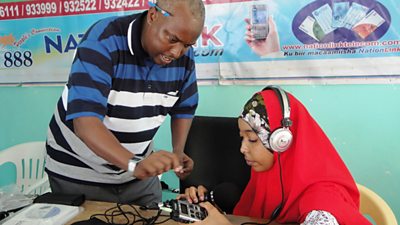Downloads
Publication date: May 2012
Summary
- ±«Óătv Media Action’s EC-funded project in Somalia led to the realisation of clear editorial processes for some stations, use of appropriate sources for news programmes, and improvements to journalists’ understanding and observance of journalistic skills.
- Somali audiences reported that stations’ programming better met their needs following the training for journalists and station managers. However despite good recall of the content of the programme broadcast through this project, there was little evidence of what participants had learned from the project.
- Civil society organisations said their knowledge and engagement with journalists had increased as a result of the training, but only a few organisations could provide evidence of improvements. Longer-term media engagement strategies with a focus on implementation of skills, as opposed to increased learning, are needed.
- The provision of equipment, training, and mentoring improved stations’ ability to produce quality programming. However the sustainability and financial viability of the stations is still reliant on the on-going safety threat to station staff and mentors, and stations’ lack of financial and business planning.
The project
This project aimed to build the capacity of the media in Somalia to provide balanced reporting and to facilitate dialogue between citizens, civil society, and government in moving towards a peaceful transition and the understanding of civic and human rights. It aimed to encourage a relationship between civil society organisations and the media and encourages these two groups to engage in democratic processes and take an active role in civil society activities – particularly related to governance, peace building and human rights. It had three strands:
- a media sector analysis, to support donors and government bodies to determine their policy priorities
- a tailored training and production programme to build the capacity of six Somali radio stations
- training of local CSOs to use the media as a tool for information dissemination and advocacy
Research methodology
Research to evaluate the impact of the project took place in April and May 2012. We undertook: 20 focus group discussions with audiences and five with journalists in the five regions in which the stations operate (1); six interviews with mentors and six with CSOs in Puntland, Somaliland, and South Central Somalia and station assessment tools were used with the station manager at each radio station.
Findings
Following the training, most stations had clear editorial processes in place, with multiple people involved in editing and reviewing news and programme content. Four of the six stations were continuing to hold regular editorial meetings. Stations and journalists appeared to have changed their use of sources, including using opposition leaders and the general public for news programmes where before they were not. However, there did not seem to have been a change in other programme formats or types of programmes.
Interviewees reported that journalists' understanding and observance of journalistic skills (such as bearing the audience in mind when developing programming; the importance of engaging with audiences and values such as neutrality in reporting) had improved. The project also improved journalists’ editing abilities and knowledge of programme editing software. However, many journalists still defaulted to using 'experts' for wider programme formats, and were not regularly consulting with the general public or using audience feedback to change their programming.
For audiences, the biggest impact of the programme was that the majority reported that stations met the needs of their community. Some concerns were still raised, such as stations not making programmes as relevant to women, or seeking and using audience feedback. The majority of audiences could recall the radio programmes, could report that it related to governance, peace building and human rights, and felt the programmes were relevant to the community. Although the majority of participants reported learning from and discussing the programme with others, few could provide concrete examples of what they had learnt or taken away from the programme.
Civil society organisations (CSOs) reported that the training increased their skills in the appropriate use of words in radio and print, radio interview preparation, and delivering messages to reach audiences. They also reported that they were highly engaged with journalists, but only provided a few examples (such as holding a press conference or participating in one of the project’s programmes as an interviewee). Despite high awareness by CSOs of the need for interaction with the media, the research provided little evidence that engagement between CSOs and the media had increased.
Radio stations reported that the provision of equipment, training and mentoring had improved their ability to produce quality programmes. However, the sustainability and financial viability of the radio stations, and the impact of training and on-site mentoring, are limited by the poor security environment and lack of steady income and financial planning. As a result, aspirations of some stations (such as to provide journalists with a salary) are likely to be difficult to achieve, and may restrict stations’ ability to implement training.
Implications
The project led to an improvement in the quality of programme making, such as changes in source usage particularly in news programming. If this learning is to be applied to other programme formats, further support is needed. The mentoring and training should also be widely available to other journalists. To have greatest impact, future projects should engage with station managers and directors. They often make the final editorial and content decisions. The one-week financial sustainability training had limited impact; future projects should consider extending such training and providing ongoing follow-up in the areas covered.
Footnotes
1. Endline evaluation was not undertaken with Radio Dhusamareb. The station director was assassinated on 20 January 2012. Onsite mentoring then ceased, and the station has not been in operation since this time.
